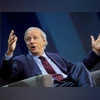Bloomberg News
The size of the Federal Reserve’s interest rate cut this week won’t be a game changer for global investors, though risks from China’s slowdown continue to weigh on their minds, according to participants at a regional forum.
Bridgewater Associates LP founder Ray Dalio said what the Fed will do this week “doesn’t make a difference” over the longer term as policymakers will ultimately need to keep real interest rates low to allow servicing of mounting debts.
“The Fed has to keep interest rates high enough to satisfy the creditors that they are going to get a real return without having them so high that the debtors have a problem,” Dalio told Bloomberg Television’s Haslinda Amin on the sidelines of the Milken Institute Asia Summit 2024 in Singapore on Wednesday.
The Fed is widely expected to reduce interest rates later Wednesday after holding borrowing costs at a two-decade high for more than a year. Investors and forecasters are split over whether it will cut by a quarter percentage point or a half point, as officials seek to bring the economy to a soft landing.
“It’s more important to stay focused on the longer term, and particularly for equity investors to think about a five or 10-year horizon,” Capital Group Companies Inc. Vice Chair Jody Jonsson said in a separate interview at the event. Regardless of the size of the cut, Jonsson said it won’t change “anything that I do in my own portfolio.”
Cain International CEO Jonathan Goldstein said return to office policies are as important to the fate of the real estate industry as any interest-rate cuts by the Fed.
More From This Section
But investors have expressed concern over a slowdown in China that’s putting pressure on authorities there to respond with fiscal and monetary stimulus so the world’s second-largest economy can hit its growth target of around 5%.
China is suffering “worse-than-expected scar effects” from the Covid-19 outbreak, said Fang Fenglei, founder and chairman of Hopu Investment Management, citing falling stock markets and foreign direct investments.
Still, while investors hope for stronger stimulus policies to boost growth, China’s leadership “doesn’t care much about short-term interests” due to its long-term rule, “people first” mentality and Chinese-style political economics, Fang said.
Chinese policymakers are wary of repeating what happened previously when a 4 trillion yuan ($564 billion) stimulus it undertook after the financial crisis inflated property prices and led to overcapacity, Fang said.
China’s industrial output marked its longest slowing streak since 2021 in August, with consumption and investment weakening more than expected, based on data published Saturday. Before the data release, the People’s Bank of China signaled that fighting deflation would become a higher priority and indicated more monetary easing ahead.
Don Guo, chief investment officer at Prudential plc, said he’s “never seen so much pessimism” toward China during his entire investment career. Yet, the country is still the “largest growth engine for the world,” he told a panel at Milken, adding that his recent visit to Shenzhen and Guangzhou showed a lot of activity on the ground particularly in the electric vehicle space.
Dalio said a small part of his family office’s portfolio remains invested in China, but pointed out that there are “real issues” in the country.
“There’s a small percentage of our portfolio which is in China and we’ll stay in China through this process,” he said, adding that the country remains a “very attractively priced place” to invest in.
The problems with China’s economy are “a big concern” for both Chinese and Western companies and “are not quickly solved with government action and are going to require a much longer time to work out,” added Capital Group’s Jonsson.
It’s not helping that neither Donald Trump nor Kamala Harris will favor trade with China, Pablo Coballasi, chairman of the Mexican Association of Private Equity and Venture Capital Funds, said on a separate panel.
)